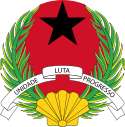1972 Portuguese Guinea National Assembly election
| ||||||||||||
91 of 120 seats of the National Assembly 61 seats needed for a majority | ||||||||||||
This lists parties that won seats. See the complete results below.
| ||||||||||||
 |
|---|
Indirect elections to a National Assembly were held in the parts of Portuguese Guinea held by the rebel African Party for the Independence of Guinea and Cape Verde (PAIGC) between August and October 1972,[1] but not in the Portuguese-controlled areas of Bissau, Bolama, the Bissagos Islands and Bafatá.[2]
A single list of PAIGC candidates for Regional Councils was approved by 97% of voters with a 93.4% turnout.[3] The number of people voting was approximately 32% of the voting-age population.[4]
Electoral system
[edit]Voters elected 273 members of 11 regional councils. The elected councillors then convened to elect 91 members of the 120-seat National Assembly. The remaining 29 seats were to represent the four regions still under Portuguese control, and these members were chosen by the PAIGC.[1]
The elections took six weeks, with ballot papers carried around the country on foot. The ballot papers had been printed in neighbouring Guinea.
Results
[edit]| Party | Votes | % | Seats | |
|---|---|---|---|---|
| African Party for the Independence of Guinea and Cape Verde | 75,163 | 96.97 | 120 | |
| Against | 2,352 | 3.03 | – | |
| Total | 77,515 | 100.00 | 120 | |
| Registered voters/turnout | 83,000 | – | ||
| Source: Nohlen et al. | ||||
Aftermath
[edit]The new National Assembly met for the first time in Boe on 24 September 1973.[1]
References
[edit]- ^ a b c Michael Cowen & Liisa Laakso (2002) Multi-party Elections in Africa, James Currey Publishers, p108
- ^ Elections in Guinea-Bissau African Elections Database
- ^ Dieter Nohlen, Michael Krennerich & Bernhard Thibaut (1999) Elections in Africa: A data handbook, p466 ISBN 0-19-829645-2
- ^ Cowen & Laakso, p109


 French
French Deutsch
Deutsch